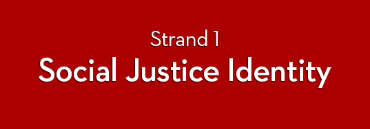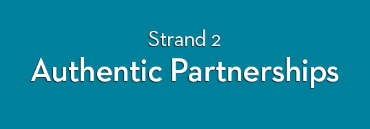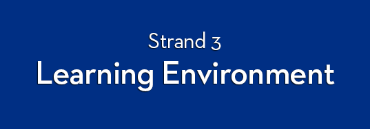
Teacher Ed Approach
Mission
Teacher Education at Seattle University prepares social justice educators who actively strive for educational equity in partnership with students, families, and communities furthest from justice, through a lifelong process of critical reflection and action rooted in anti-racist and humanizing pedagogies.
Strand 1: Social Justice Identity
Essential Question: How will you develop your identity as an anti-racist, humanizing teacher working for social justice?
Rationale: The social justice identity of teacher candidates will be further developed throughout their time in the MIT program. This identity development is foundational. The teacher’s identity influences their pedagogy and their work with students. Engaging with a teacher's personal history and ethical stances can foster deeper dialogues about social justice (Boylan and Woolsey, 2015). An essential role of a social justice educator is digging deep and actively working on their identity development to deepen their ongoing commitment to developing their knowledge, skills and dispositions for enacting anti-racist and humanizing pedagogies (Sealey-Ruiz, 2020).
Program Competencies:
- Teacher Candidates (TCs) are committed to examining their own histories, identities, biases, assumptions and their own tensions with racism and oppressions.
- TCs value learning as a lifelong process in becoming an anti-racist educator.
- TCs recognize students' intersecting identities and critically reflect on how biases, perceptions, expectations and actions in classrooms and schools affect their learning opportunities.
- TCs understand how anti-racist and humanizing pedagogies impact the teacher student relationship and professional relationships.
- TCs understand how historical and institutional structures create and maintain racial and other inequities and oppressions in education.
- TCs develop the skills to reimagine and enact solutions to the inequities within schools, specifically focused on students who are disproportionately harmed on a micro or macro level, based on their various identities (racial, ethnic, gender, sexual, etc.)
- TCs demonstrate the expectations and requirements of the teaching profession and engage with all stakeholders in humanizing ways.
Strand 2: Authentic Partnerships
Essential Question: How will you partner with families, communities, and school personnel to cultivate learning opportunities in pursuit of educating the whole person?
Rationale: Equitable education is not achieved in isolation; it requires authentic partnerships within schools and the local community, including indigenous communities. Interactions with families, communities and school personnel are approached in an asset-based way and intentionally positions families and community members as experts.
Program Competencies:
- TCs are committed to listening to and honoring the voices of persons who are from communities furthest from justice, including indigenous communities.
- TCs value the partnerships with families, communities and other school personnel as a necessity in educating the whole person.
- TCs understand the purposes and principles behind developing and maintaining authentic partnerships.
- TCs develop asset-based practices and pedagogies in collaboration with students, families and communities in pursuit of educating the whole person.
- TCs demonstrate accountability to the community through cycles of feedback, action, and co-reflection with families, school personnel and community partners.
Strand 3: Learning Environment
Essential Question: How will you facilitate an inclusive and culturally sustaining learning community in your classroom that fosters a sense of belonging and agency for each student?
Rationale: Developing a healthy and healing learning environment is a skill to be developed and is essential in enacting anti-racist and humanizing pedagogy. The learning environment developed by the teacher candidate will be a result of sincere, humanizing relationships with students. Creating a learning environment that prioritizes relationship development, maintenance and restoration shifts the focus away from “classroom management,” which can dehumanize students and perpetuate injustices.
Program Competencies:
- TCs believe that “all learners can achieve at high levels and persist in helping each learner reach their full potential.” (INTASC, 2(l))
- TCs create classroom communities where students' identities, cultures and languages are valuable resources for learning.
- TCs collaborate with learners to establish and monitor expectations for a learning community to foster and maintain a sense of belonging, agency, and collective responsibility for the classroom.
- TCs create classrooms where learners have agency to regularly name, critique and address injustices.
Strand 4: Planning, Instruction & Assessment
Essential Question: How will you design and enact relevant and meaningful instruction and assessment to develop students' identities, knowledge, understandings, skills, and dispositions to bring creativity and innovation to the world's most pressing issues?
Rationale: Planning, instruction and assessment of skills must be done within the context of further developing students’ identities, intellect and criticality (Muhammad, 2019). In order for teacher candidates to build their capacity to enact equitable teaching practices they must first develop their own social justice identity, authentic partnerships with families, communities and school personnel, and be able to develop a learning environment that fosters a sense of belonging and advocacy.
Program Competencies:
- TCs utilize strategies to prepare all students to be responsible for an environmentally sustainable, globally interconnected and diverse society.
- TCs make careful decisions about the content they teach using a social justice lens and the ways of knowing and doing in the discipline.
- TCs design and enact meaningful and responsive instruction in which alignment exists between content goals, assessment and students' identity development, assets and diverse learning needs.
- TCs apply research-based theories of learning and development to design and enact equitable instruction.
- TCs design and enact instruction and assessment using a range of equitable instructional models and technologies so that learners can apply knowledge in authentic ways and develop critical thinking skills.
- TCs design and enact instruction and assessment in which students can develop academic language and literacy skills to engage with content and represent their ideas in a range of modalities.
- TCs incorporate tools of language teaching to foster English language development and provide opportunities for students to draw on their home languages for learning.
- TCs understand and apply humanizing strategies and resources to support students with exceptional needs, including disabilities and giftedness.
- TCs enact assessment strategies to adjust and differentiate instruction and to support students in monitoring their own learning.
- TCs seek out feedback and engage in ongoing critical reflection to strengthen their practice.




